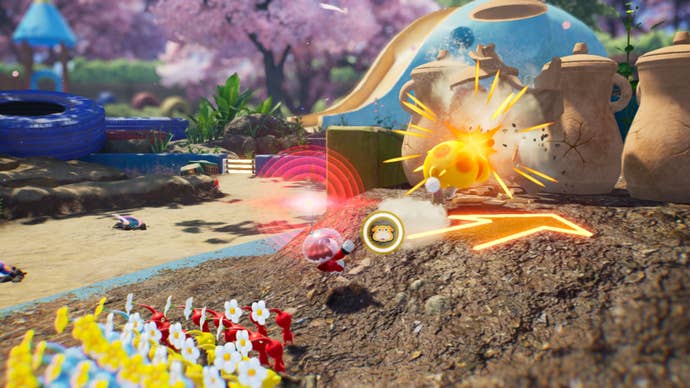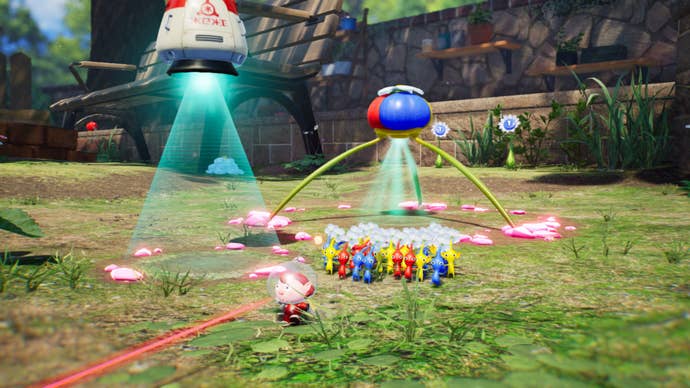[ad_1]
You may or may not be familiar with the concept of Dandori, but if you’ve played any Pikmin games in your lifetime, you probably have a good idea of what it is.
Dandori, as explained by Pikmin 4, is the ability to organise tasks strategically and work effectively to execute plans. This idea is pretty important to Pikmin’s gameplay, given that everything you need to do when commandeering your army of plant-animal hybrids can in most cases – be done more strategically. And, thus, effectively.
This means getting more done with your Pikmin day than you might first expect. You’ll spy treasures near and afar in each area or cave, as well as enemies and other hazards.
Now, you could trust your Pikmin to retrieve each treasure unscathed (please never trust your Pikmin to do anything alone), or you can spend a tiny bit of time scoping out the place and planning how to execute your heist.
Plot your route around that cave, have those red Pikmin clear fiery hazards in advance, hop on Oatchi and get going. Before you know it, you’ve completed that cave and emptied it of treasures and resources. Without killing off any Pikmin. If you hadn’t stopped and thought about your approach, you might end up like me, in my current situation: stuck in a cave with only four living Pikmin. I’m sorry, fellas. I fucked up. It’s a good thing that Pikmin 4 will let you undo your mistakes, but the real art of Dandori is organising yourself so that these mistakes don’t happen.
That’s what Pikmin is all about. Yes, you’re on a wild adventure to rescue your dear friend, Captain Olimar, but this rescue mission is one that is full of trial and error – or conscientious planning. Without your planning, you’ll run into accidental massacres, or a lack of time (each as deadly as each other in this world). And you won’t get far, very fast, in Pikmin this way. It’s not exactly a hard game, but Pikmin 4 is constantly reminding you of ways to make things easier for yourself, and Dandori is just that.
When asked about players’ fears of accidentally sending Pikmin to their deaths, Shigeru Miyamoto shared in a developer diary: “I get that people find it more difficult when death is a factor. But I think the franchise’s strength lies in its relationship with morality. If something is irreversible, you need to figure out a way to prevent undesired things from happening. To prevent Pikmin from dying, you need to practise Dandori. To me, that’s what makes this game unique.

“I think people find Pikmin difficult for two reasons: the controls and the depth of the gameplay. I spent a long time mulling over how we could convey these points as interesting rather than difficult.”
I think there’s a lot to take from Shigeru Miyamoto’s words (and Pikmin 4’s focus on Dandori) that many of us could apply in real-life; the idea of viewing things as interesting, rather than difficult, certainly makes approaching most games – or even some life events – less of a feat.
If you’re still not entirely sure what Dandori is, throw yourself into one of Pikmin 4’s Dandori battles, where you’ll engage in a 1v1 skirmish to score the most points. Points are accrued by using your army of Pikmin to gather as many treasures and enemies as possible, with their weight determining your points. To win these battles, you want to spread out your Pikmin as efficiently as possible so you can gather more items than your opponent. To do so, you need to be efficient, forward-looking, systematic.
You’ll also see Dandori in action when exploring open areas during the day. You’ll have a set amount of time to do whatever you want to do before you must return to base; if you want to do everything, you’ll need to explore and plan before setting your Pikmin free on the environment. You’ll also need to do the same in caves if you want to escape with all of your Pikmin intact. You need to be coherent, methodical, logical.

Applying Dandori to real-life is a matter of improving your organisation skills, and it’s something I try to consciously do, at work and at home. Right now, I have a bunch of work-related tasks to do, and I’m writing this particular Pikmin piece right now in order to free up time for other work later. Had I flipped my tasks the other way round, however, I might’ve never gotten around to writing this piece (trust me, guide work can swallow you whole if you let it).
At home, I’m swamped with cleaning tasks and general life admin; you could argue that something as simple as ‘making sure you do your chores’ and ‘make those important phone calls before sitting down to play games’ is Dandori. It’s a simple concept, and some of us probably practice without even realising.
This isn’t something you’ll apply everyday, or necessarily even need to, but it is something I’ve noticed myself trying to integrate more into my real day-to-day life since playing Pikmin 4. I’m constantly, now, thinking of how to reorganise my tasks or plan out my week so that I can actually get as much done as possible. I’ve even managed to commit to yoga again, carving out time to practice each evening before I let myself get into bed, under the premise of this being ‘good Dandori’ for me. If I do my yoga, I’ll sleep better, and I’ll be able to do more the next day!
I’m a huge culprit of letting myself ‘go with the flow’, both in-game and in-real-life, so being more conscious of how I can organise my tasks so I can actually complete more each day or get more done in that video game – whether it’s Pikmin 4 or Baldur’s Gate 3 – has slowly got me less overwhelmed by the tumultuous nature of life.
Now, if only I could recruit an entire army of Pikmin to put my laundry away for me. That would be nice.
[ad_2]